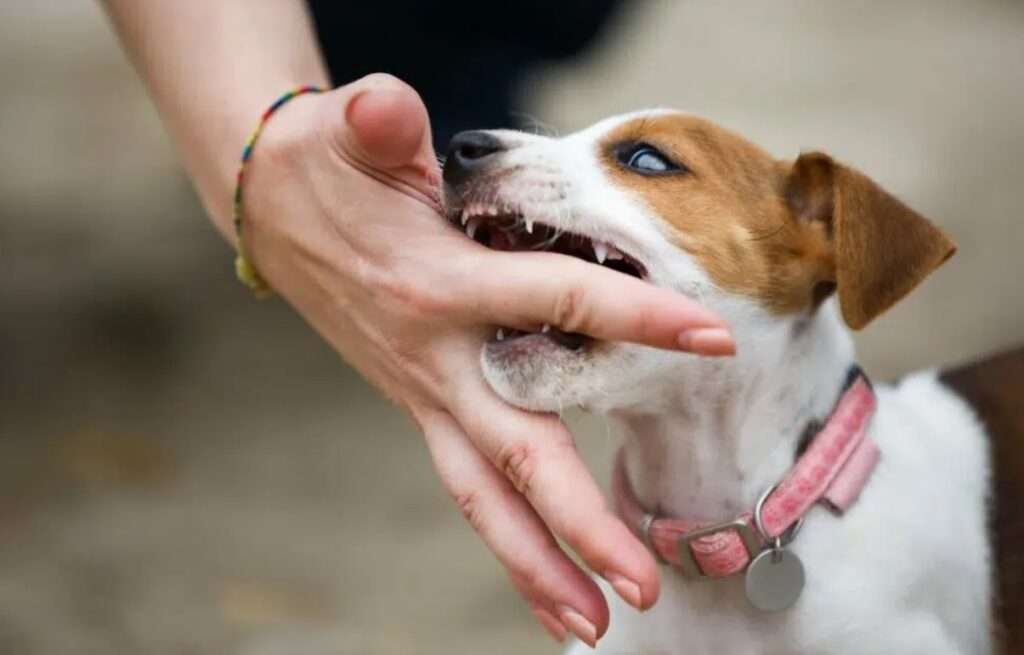Introduction

Puppies are undeniably adorable, with their fluffy fur, wagging tails, and playful antics. However, one common behavior that can be frustrating for puppy owners is biting. If you’ve ever wondered why do puppies bite and how to stop it, you’re in the right place. In this Doggo Life guide, we’ll explore the reasons behind this behavior and provide you with practical tips on how to stop a puppy from biting.
Why Do Puppies Bite?
Puppies bite for various reasons, and understanding these reasons is the first step in addressing the issue. Let’s delve into some of the common motivations behind puppy biting:
(a) Teething
Just like human babies, puppies go through a teething phase. During this period, their baby teeth fall out, and their adult teeth begin to emerge. Teething can be uncomfortable, and biting on objects, including your hands, can provide relief. Teething usually occurs between three and six months of age, and it’s essential to be patient and understanding during this time.
(b) Exploration and Play
Puppies explore the world around them using their mouths. When they interact with new objects or people, they may instinctively use their teeth. This behavior is a natural part of their development, but it needs to be managed to ensure they don’t become overly bitey.
(c) Communication
Puppies also use biting as a form of communication. When playing with their littermates, they often engage in gentle nipping as a way to signal their intentions or establish dominance within the group. While this behavior is normal in a puppy’s socialization process, it’s crucial to teach them to inhibit their bite when interacting with humans.
How to Stop a Puppy From Biting
Now that we’ve explored the reasons behind puppy biting, let’s discuss effective strategies to prevent or address this behavior.
(a) Socialization
Socialization is a crucial aspect of a puppy’s development. It helps them become well-adjusted and less prone to aggressive behavior. Encourage positive interactions with other dogs and people from a young age, so they learn appropriate ways to communicate and play. This can help reduce excessive biting later on.
(b) Bite Inhibition Training
Bite inhibition is the ability of a puppy to control the force of their bite. This is a vital skill for any dog to learn, as it helps prevent accidental injuries during play. To teach bite inhibition, follow these steps:
- When your puppy bites you, let out a high-pitched yelp to mimic the way another puppy would react when bitten too hard.
- Immediately stop play and withdraw your attention for a brief moment. This teaches the puppy that biting too hard leads to the end of playtime.
- If your puppy continues to bite, repeat the process. Consistency is key, and your puppy will gradually learn to use a softer bite.
(c) Providing Chew Toys
Offering appropriate chew toys can redirect your puppy’s biting tendencies onto something more suitable. Provide a variety of toys with different textures to keep your puppy engaged and satisfied.
(d) Avoiding Rough Play
While play is essential for a puppy’s physical and mental development, avoid rough play that encourages excessive biting. If your puppy gets too excited and starts to bite aggressively, take a break and let them calm down before resuming play.
(e) Time-Outs
In some cases, when your puppy becomes overly bitey and doesn’t respond to other training methods, a time-out can be effective. If your puppy bites too hard or ignores your yelps, place them in a designated time-out area for a short period. This can help them understand that biting leads to isolation, which they naturally want to avoid.
Conclusion
In conclusion, understanding why puppies bite and how to stop them from biting is essential for fostering a happy and well-behaved canine companion. Puppies bite primarily due to teething, exploration, and communication. To address this behavior, it’s important to know why do puppies bite, and use techniques like socialization, bite inhibition training, offering chew toys, avoiding rough play, and implementing time-outs when necessary.
Remember that patience, consistency, and positive reinforcement are key to successfully curbing puppy biting. By following these guidelines and being a responsible and attentive puppy owner, you can help your furry friend grow into a well-mannered and enjoyable member of your family.
For more tips on dog training and all things related to the “doggo life,” stay tuned to Doggo Life for additional resources and information on raising a happy and healthy pup.

Dedicated and experienced pet-related content writer with a passion for animals and a proven track record of creating engaging and informative content. Skilled in researching, writing, and editing articles that educate and inspire pet owners. Strong knowledge of animal behavior, health, and care, combined with a commitment to delivering high-quality content that resonates with audiences. Seeking to leverage writing skills and passion for pets to contribute to a dynamic and mission-driven team.
